We all harbor a secret desire, a flickering hope that someday, we might stumble upon a hidden treasure. It’s a universal fantasy – the idea of a life-changing stroke of luck, a serendipitous discovery that transforms our everyday existence. While most of us might dismiss it as the stuff of movies and adventure novels, the truth is, reality often has a way of surprising us. Hidden within the ordinary, nestled amidst the mundane, lie stories of everyday people who found themselves face-to-face with unexpected fortune.
From dusty attics to online auctions, inside forgotten furniture and beneath backyard trees, these tales of unexpected riches prove that sometimes, reality is far stranger, and more rewarding, than fiction. They offer a glimpse into the human experience when confronted with unforeseen wealth, showcasing the complexities of ethics, gratitude, and the sheer disbelief that washes over us when we least expect it.
Let’s delve into ten captivating stories of those who found themselves staring at an unexpected windfall, and how they navigated the emotional whirlwind and often-complicated consequences that followed.
The Renovation Revelation: A $189,000 Point of Contention
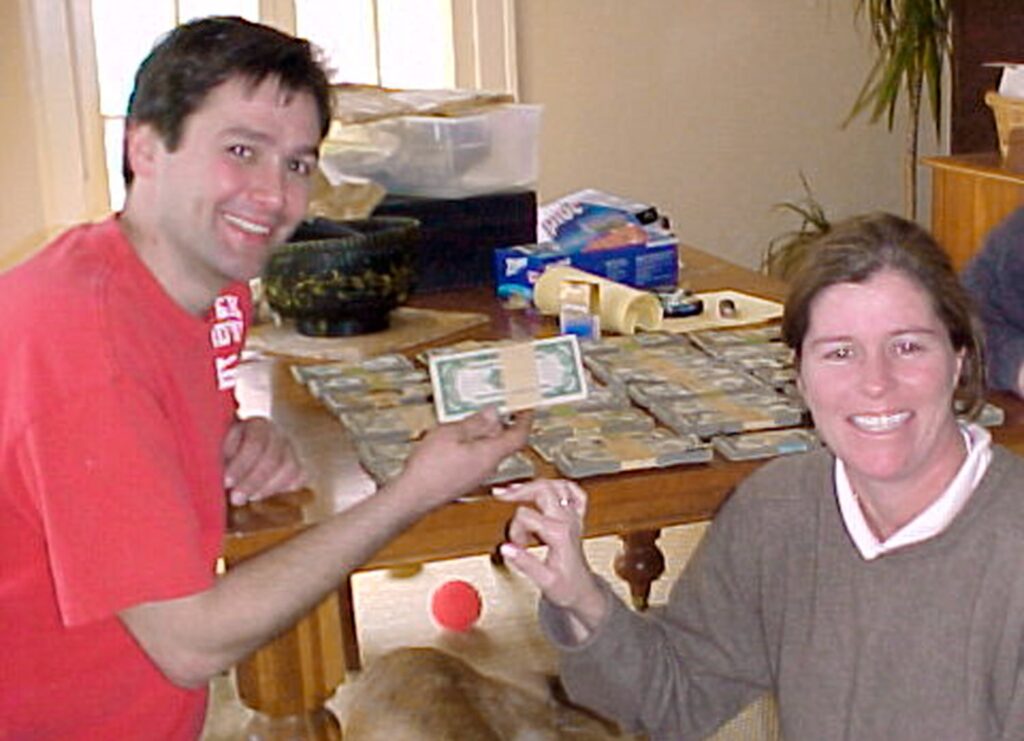
Imagine the scene: you’re a builder, hired to renovate an old friend’s recently inherited home. The air is thick with the smell of sawdust and the rhythmic pounding of your hammer echoes through the rooms. But as you tear down a wall, a secret reveals itself – a locked metal box, tucked away behind the plaster and forgotten by time.
This is exactly what happened to Bob Kitts, a builder from Ohio. Inside the box? A staggering $189,000 in cash. At first, it’s a moment of pure joy and shared elation. Bob and the homeowner, Amanda, celebrate their incredible luck, posing for pictures with their newfound treasure. But as the dust settles and the reality of the situation sets in, the dynamics shift.
Bob, feeling entitled to a finder’s fee for his unexpected discovery, believes he deserves a 40% share of the money. Amanda, now the legal owner of the house and everything within it, disagrees, offering a mere 10%. What began as a heartwarming story of friendship quickly spirals into a bitter legal battle. Fueled by the allure of such a significant sum, both parties dig in their heels, unwilling to compromise.
The situation escalates, attracting media attention and drawing in a surprising new faction – descendants of the home’s original owners. Twenty-one individuals come forward, claiming their rightful share of the hidden inheritance. After months of legal wrangling, the court reaches a decision. Bob, the man who stumbled upon the cash-filled box, receives a paltry $3,500. The remaining sum is divided amongst the descendants, leaving Amanda, the homeowner who refused to negotiate with Bob, with nothing.
This cautionary tale underscores the importance of clear communication, legally binding agreements, and the unpredictable nature of human behavior when faced with sudden wealth. It serves as a reminder that even seemingly straightforward situations can quickly devolve into complex disputes when large sums of money enter the equation.
Source: nbcnews.com
The Free Couch with a Heartfelt Surprise
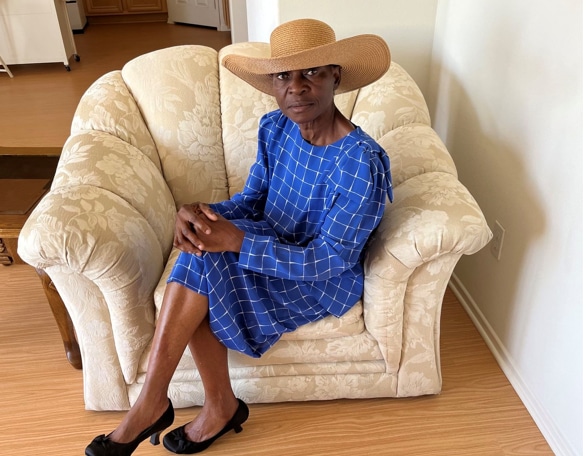
In a world increasingly focused on material possessions and instant gratification, stories of genuine kindness and integrity shine even brighter. Vicki Umodu from California found herself at the center of such a story, reminding us that sometimes, the most valuable treasures aren’t measured in dollars and cents.
Vicki, in the process of furnishing her new home, stumbled upon an online listing offering a free couch and matching armchair. Eager to save money and furnish her living room, she quickly arranged for pickup. The previous owner explained that the furniture had belonged to a deceased family member, and he was simply looking to find them a new home.
Days later, settling into her “new” couch, Vicki noticed something peculiar. The cushions felt strangely lumpy, as if something was hidden within. Curiosity getting the better of her, she investigated further, eventually discovering a series of envelopes tucked deep inside the chair. To her astonishment, the envelopes were filled with cash – a total of $36,000.
In that moment, Vicki was faced with a choice. She could easily have kept the money, justifying it as a lucky find. But something inside her, a deep sense of right and wrong, wouldn’t allow it. She immediately contacted the previous owner, explaining her discovery and offering to return the money.
The man, completely unaware of the hidden cash, was overwhelmed with emotion. He had no idea his relative had stashed away such a large sum and was profoundly grateful for Vicki’s honesty. He offered her a $2,200 reward, a token of appreciation for her integrity.
Vicki’s story serves as a powerful reminder that in a world often driven by self-interest, acts of kindness and ethical behavior can have a ripple effect, fostering trust and goodwill.
Source: nypost.com
The $100 Dresser with a $155,000 Historical Legacy
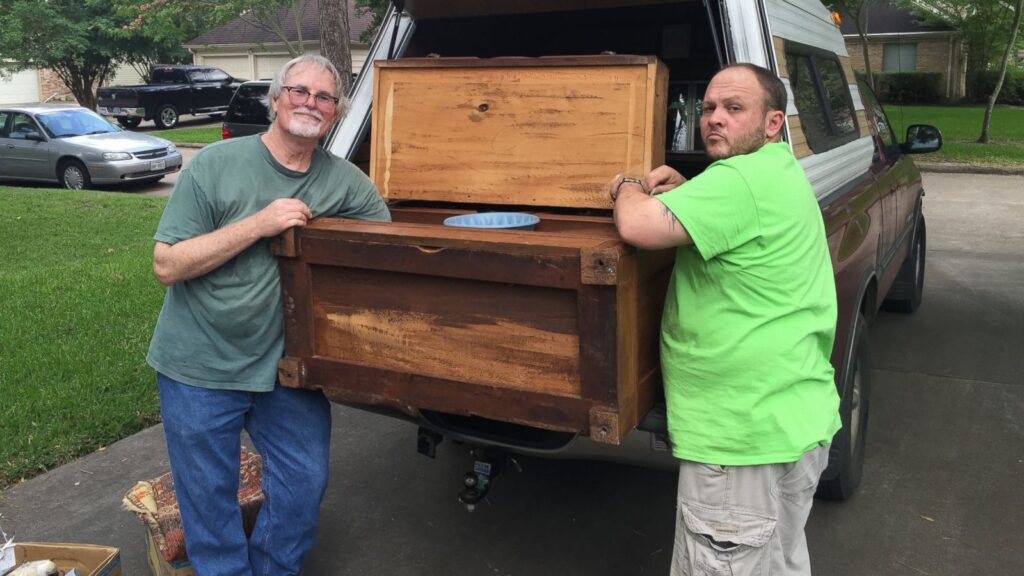
Emil Knodell, a retired man from Texas, enjoyed the thrill of the hunt. Not for sport or adventure, but for unique and interesting items to add to his home. One day, his search led him to an estate sale, a treasure trove of memories and belongings from a life passed. Amongst the furniture and knick-knacks, his eye was drawn to a beautifully crafted, yet somewhat worse for wear, antique dresser.
After some friendly negotiation, he purchased the dresser for a mere $100. Loading it onto his truck, Amil heard a strange rattling sound coming from within. He checked the drawers, but found nothing out of place. The rattling persisted as he drove home, piquing his curiosity.
Determined to get to the bottom of the mystery, Amil took a closer look at the dresser. It was then that he noticed it – a cleverly hidden compartment, practically invisible to the naked eye, located at the back of the bottom drawer. With anticipation building, he carefully pried open the compartment, revealing its long-held secret.
Inside, nestled amidst velvet lining, lay a collection of gold and silver coins, sparkling diamond jewelry, and a small velvet pouch. Amil’s breath caught in his throat as he opened the pouch and discovered a collection of Civil War medals. It was clear that this wasn’t just a random assortment of valuables; it was a family heirloom, imbued with history and meaning.
Overwhelmed by the historical significance of his discovery, Amil knew he couldn’t keep it for himself. He reached out to the estate sale organizers and, through them, contacted the deceased owner’s family. The family was overwhelmed with gratitude, explaining that the hidden compartment and its contents had been a closely guarded family secret, passed down through generations.
The items were appraised and valued at over $155,000. Despite this, Amil never wavered in his decision to return the treasure. His act of selflessness serves as a testament to the fact that some things are far more valuable than money.
Source: abcnews.go.com
The Reclusive Millionaire and the Unclaimed Inheritance
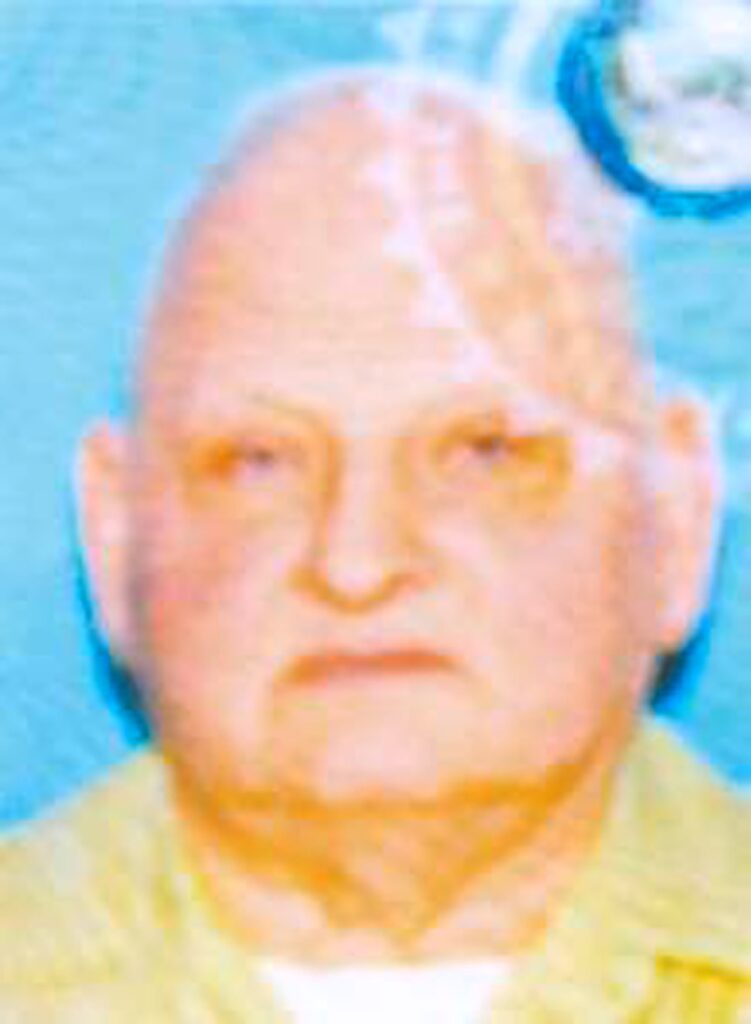
The saying “You can’t judge a book by its cover” holds true for people as well as for dusty old books. Walter Samesko, a resident of Nevada, was a man of few words and even fewer possessions, at least that’s what his neighbors believed. Living a quiet life, he kept to himself, rarely interacting with those around him. When he passed away, his passing went unnoticed for several weeks, until a persistent odor caught the attention of concerned neighbors.
Upon entering his modest home, however, authorities made a shocking discovery. This unassuming man, perceived by many as a solitary recluse, had been harboring a secret fortune within the walls of his garage. Stacked neatly within numerous ammo boxes were gold coins – a vast collection amassed over the years, with a total value exceeding $7.4 million.
The discovery sent ripples through the community and sparked a search for Samasko’s next of kin. It was later revealed that his mother, a passionate coin collector, had started the collection, and upon her passing, it had fallen into Walter’s care. Whether he knew the true extent of its worth remains a mystery.
After an extensive search, authorities located Samasko’s only living relative – his cousin, Arlene, a humble school teacher residing in California. Arlene, who had never met her reclusive cousin, was stunned by the news.
This unexpected windfall, a testament to her family’s hidden legacy, provided Arlene with financial security she could have only dreamt of. It serves as a reminder that life can take unexpected turns and that fortunes can sometimes be found in the most unassuming places.
Source: nbcnews.com
The Backyard Safe and the Neighborly Act of Kindness
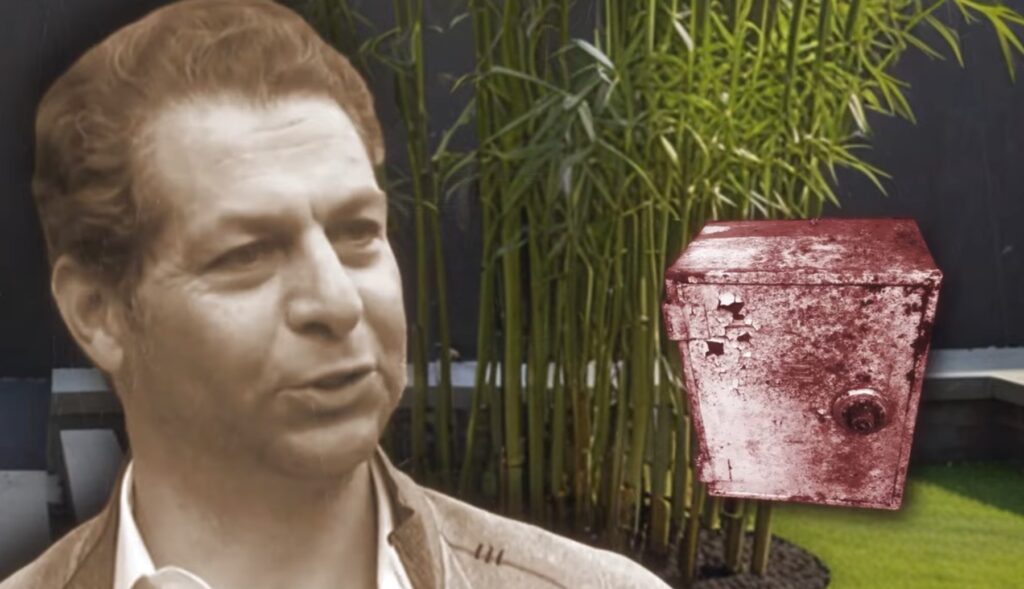
Sometimes, the most valuable things in life are found, not acquired. For Matthew Emanuel, a resident of Staten Island, that discovery came in the form of a rusty old safe, hidden beneath years of accumulated leaves and overgrown foliage in his backyard.
Matthew had lived in his house for four years, completely unaware of the hidden treasure lying just feet from his backdoor. He had always assumed the rusty metal box was an old electrical box, its true purpose concealed by time and neglect. It wasn’t until he hired landscapers to refresh his backyard that the mysterious box’s true nature was revealed.
Intrigued by the heavy, rusted box, Matthew and the landscapers decided to investigate. Using a small excavator, they carefully unearthed the box, revealing its true form – a vintage, bulletproof safe. Excitement rippled through the air as they worked tirelessly to crack the safe, their imaginations running wild with possibilities.
After hours of effort, the heavy door swung open, revealing its contents – stacks of cash, valuable jewelry, and a small, yellowed envelope. Curiosity got the better of them, and with trembling hands, Matthew opened the envelope, revealing a handwritten note and an address. To their astonishment, the address belonged to none other than Matthew’s next-door neighbors.
It turned out that the safe had been stolen from his neighbors seven years prior. The thieves, overwhelmed by its weight, had stashed it in Matthew’s overgrown backyard, intending to retrieve it later. However, they never returned, and the safe remained hidden, its existence fading into a distant memory.
Matthew, without hesitation, returned the safe and its contents – a staggering $50,000 in cash and $38,000 worth of jewelry – to his rightful owners. His neighbors were overwhelmed with gratitude, praising his honesty and kindness. While Matthew received a heartfelt thank you, the true reward for him was the satisfaction of knowing he had done the right thing.
His story serves as a heartwarming reminder that integrity and compassion are invaluable, proving that sometimes, the greatest treasures are found in the act of giving, not receiving.
Source: nytimes.com
A Costly Banking Error and a Downfall Fueled by Greed

The allure of sudden wealth can be intoxicating, but as Robert and Tiffany from Pennsylvania discovered, it can also lead to poor decisions with devastating consequences. Their story, a cautionary tale about greed and the dangers of instant gratification, began with a seemingly fortunate, yet ultimately disastrous, banking error.
One morning, Robert, going through his usual routine, checked his bank account balance. He was greeted by an unbelievable sight – over $120,000 sat in their account, a stark contrast to their usual balance. At first, they assumed it was a mistake, a technical glitch that would soon be rectified.
Hours turned into days, and the money remained untouched. Hesitant to contact the bank and risk “losing” their newfound fortune, Robert and Tiffany decided to test the waters. They cautiously paid a small bill – it went through without a hitch. Emboldened, they paid another, larger bill. Again, success!
Fueled by a mix of disbelief and exhilaration, they convinced themselves that fate had smiled upon them. Throwing caution to the wind, they embarked on a spending spree, paying off all their debts, purchasing a brand new SUV and a campervan, and even generously donating to friends in need.
Their extravagant lifestyle, however, was short-lived. A week later, reality came knocking, in the form of a phone call from the bank. The $120,000, they were informed, had been mistakenly deposited into their account. It was not a gift from the universe, but a clerical error that now left them indebted to the bank for the full amount.
Panicked and overwhelmed by the weight of their actions, Robert and Tiffany made a decision that would seal their fate. They chose to ignore the bank’s calls, hoping the problem would magically disappear. Their avoidance tactics proved futile. The bank, determined to recover their funds, involved the authorities.
Robert and Tiffany were arrested and charged with theft. Their ill-gotten gains were seized, their new possessions repossessed, and they faced the harsh reality of their actions. The court, unsympathetic to their plight, sentenced them to seven years of probation, a permanent stain on their record, and a constant reminder of the day they let greed dictate their choices.
This cautionary tale underscores the importance of financial responsibility, ethical decision-making, and the often-devastating consequences of succumbing to greed, even when presented with seemingly easy opportunities.
Source: thesun.co.uk
The $995 Dusty Bag and the Moonrock Revelation
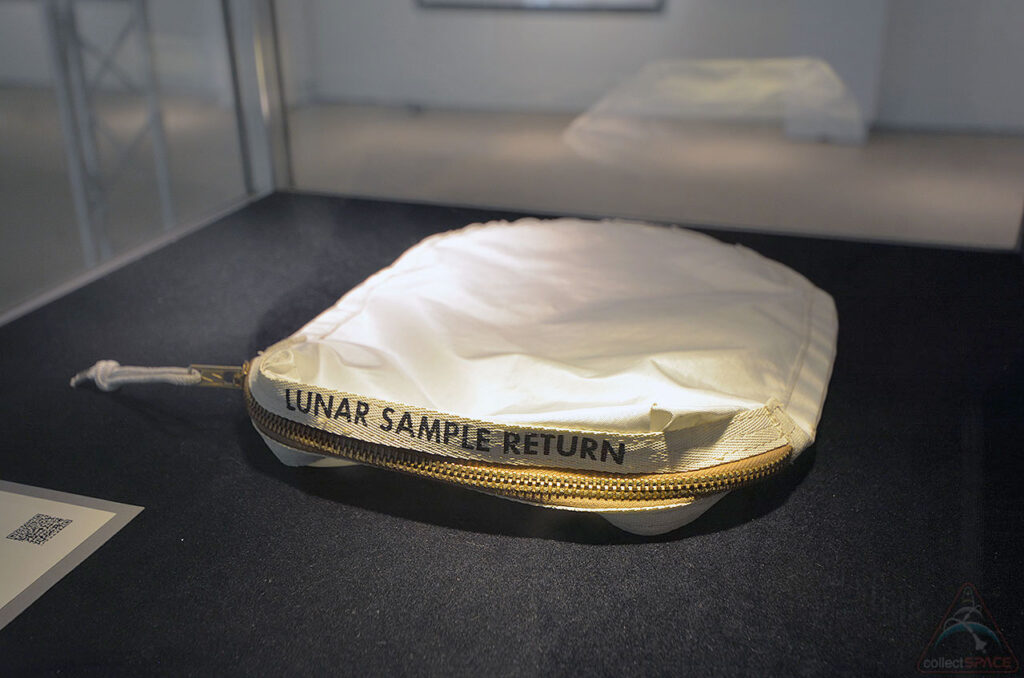
For Nancy Lee Carlson, an avid collector with a passion for space exploration, online auctions were more than just a hobby – they were a portal to discovering unique and historical artifacts. Little did she know, her keen eye and intuition would lead her to a truly out-of-this-world find.
Browsing a government surplus auction site one day, her attention was drawn to an unassuming, dust-covered white bag, its purpose shrouded in mystery. Something about it intrigued Nancy, a feeling that this was more than just a discarded piece of equipment. Trusting her instincts, she placed a bid of $995, significantly higher than the current bid, and secured the mysterious item.
Upon receiving the bag, Nancy was determined to unravel its secrets. She contacted experts, meticulously researching its origins and potential significance. Her efforts led her to believe that the bag was no ordinary artifact, but rather a piece of space history, possibly connected to the iconic Apollo 11 mission.
To confirm her suspicions, Nancy sent the bag to NASA for authentication. The wait was agonizing, filled with anticipation and a healthy dose of skepticism. After a year, the results finally arrived, confirming her suspicions – the dusty white bag was indeed authentic, used to collect and store lunar samples during the historic Apollo 11 mission!
It turned out that the bag had been mistakenly categorized and put up for auction, a bureaucratic blunder of astronomical proportions. Nancy, now the legal owner of a priceless piece of space history, filed a lawsuit demanding its return. The court ruled in her favor, and the bag, once destined for a life as a forgotten surplus item, was returned to its rightful owner.
However, this wasn’t the end of the story. Realizing the bag’s immense historical and cultural value, Nancy decided to auction it off, with the hope that it would find a home where it could be properly appreciated and shared with the world. The auction, a highly publicized event, attracted bidders from all corners of the globe, each eager to own a piece of the Apollo 11 legacy.
The winning bid? A staggering $1.9 million! It is believed that NASA itself purchased the bag, ensuring its preservation and return to its rightful place in history. Nancy’s story, a testament to her sharp eye, unwavering determination, and a dash of good fortune, captivated the world, proving that sometimes, the most extraordinary treasures are found in the most unexpected of places.
Source: collectspace.com
The $120 Million Tech Heist and the Audacity of Simplicity

In the world of high-stakes cybercrime, where complex algorithms and sophisticated hacking techniques reign supreme, the story of Evaldas Rimasauska, a man who managed to steal millions from tech giants Google and Facebook using surprisingly simple methods, stands out as a testament to audacity and opportunistic thinking.
Rimšs, by his own admission, wasn’t a tech whiz or a master hacker. He was an ordinary man, driven by a desire for financial gain and a belief that he could exploit the perceived vulnerabilities of even the most powerful corporations. His plan, though audacious in its simplicity, hinged on a combination of audacity, timing, and a healthy dose of corporate naiveté.
His scheme began with a simple internet search. Rimšs came across an article detailing a new partnership between Google and Facebook and a promising tech startup. This information, readily available to the public, sparked an idea – a way to insert himself into the financial ecosystem of these tech giants and divert funds into his own pockets.
Rimšs’s plan was deceptively simple. He registered a company using a name nearly identical to the legitimate tech startup, created authentic-looking invoices, and contacted the billing departments of both Google and Facebook. He then sent fake invoices for services and products that were never rendered, exploiting a potential vulnerability in their automated payment systems.
To his astonishment, it worked. Both companies, seemingly without proper verification protocols in place, paid the invoices without question. Emboldened by his initial success, Rimšs continued this charade for two years, systematically siphoning millions from these unsuspecting corporations.
His illicit activities, however, eventually unraveled when Google, conducting an internal audit, noticed the discrepancies. The authorities were brought in, and Rimšs’s fraudulent scheme was exposed. He was arrested and charged with wire fraud and money laundering.
Despite the scale of his crimes – a staggering $98 million stolen from Facebook and $23 million from Google – Rimšs was ultimately sentenced to five years in prison and ordered to pay $26 million in restitution. While this might seem like a light sentence given the magnitude of his theft, it highlights the complexities of prosecuting cybercrime, particularly when the perpetrator operates from a foreign country with different legal systems.
Source: bloomberg.com
The $2 Photo and the Million-Dollar Outlaw
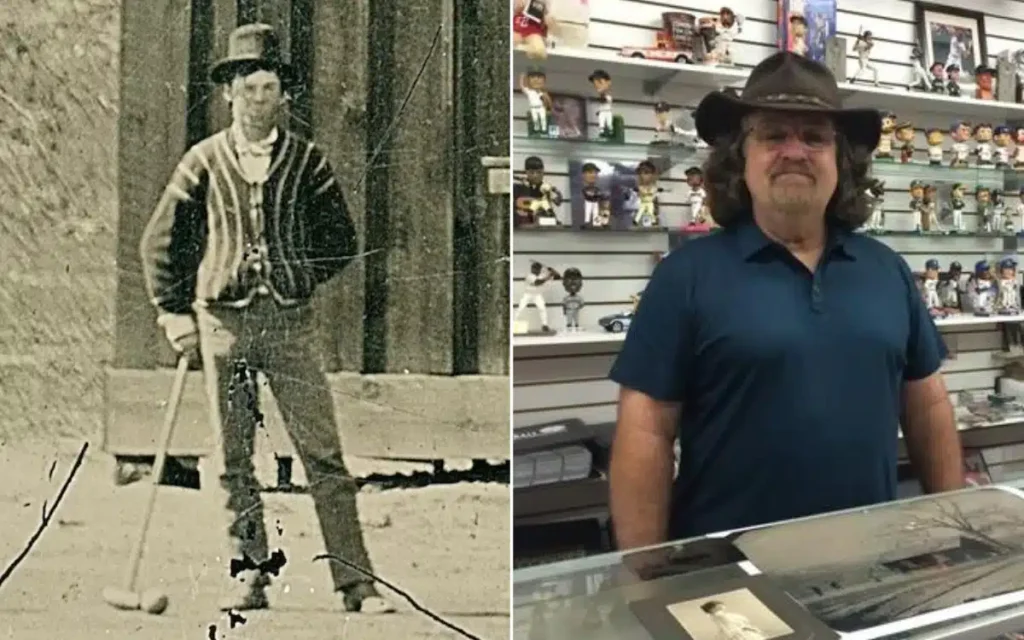
Randy Gujjaro, an avid collector with a passion for antique photographs and historical artifacts, embarked on a seemingly ordinary trip to a local antique store, unaware that destiny had a life-changing surprise in store for him.
Browsing through the store’s eclectic collection, his eyes fell upon a dusty box filled with old photographs, their subjects lost to time. Intrigued, Randy purchased the lot for a mere $2, drawn to the faded images and the stories they might hold.
Back home, as he sifted through his purchases, one particular photograph caught his eye. It depicted a group of men, their faces weathered by the elements, their clothing a mixture of rugged workwear and holstered pistols. Something about the image, the glint in their eyes, the casual confidence in their stance, struck a chord with Randy.
Intrigued, he embarked on a years-long journey to uncover the identities of the men in the photograph. He consulted with historians, pored over historical records, and meticulously compared facial features and clothing details. His relentless pursuit led him to a stunning realization – the photograph depicted none other than Billy the Kid, the legendary outlaw of the Wild West, along with members of his infamous gang.
The photo, taken in 1878, captured a rare moment of leisure for the notorious gang, their guard seemingly lowered as they enjoyed a game of croquet. Experts confirmed the photograph’s authenticity, verifying the identities of each individual and even identifying the location where it was taken.
The discovery sent shockwaves through the historical community. Previously, only one authenticated photograph of Billy the Kid was known to exist, making Randy’s find a historical treasure of immense value.
The photograph, a testament to Randy’s discerning eye and dedication to unraveling its secrets, was eventually auctioned off, fetching a staggering $5 million. The story of the $2 photograph and the million-dollar outlaw captured the imagination of the world, reminding us that history is often hidden in plain sight, waiting to be discovered by those with a passion for the past.
Source: supercarblondie.com
The Infinite Money Glitch and the Weight of Guilt

Dan Saunders, like many of us, found himself staring at an ATM screen in the dead of night. However, unlike most late-night ATM visits, Dan’s encounter would lead him down a rabbit hole of ethical dilemmas and unexpected consequences, all stemming from a seemingly innocuous discovery – a glitch in the system.
It was 2 a.m. when Dan, needing some quick cash, stopped at his local ATM. He decided to transfer $200 from his credit card to his debit card. The screen flashed an error message, indicating that the transaction had failed. Relieved, he went about his night.
However, the next day, checking his account balance, Dan noticed something peculiar – the $200 transfer, despite the error message, had actually gone through. Intrigued, he tried again, this time transferring a larger amount. To his surprise, the same thing happened – an error message, followed by the money appearing in his account.
Over the next few days, Dan experimented, meticulously documenting his findings. He discovered a pattern – the glitch only worked between the hours of 1 a.m. and 3 a.m., and it took a full day for the transfer to be reflected on his credit card account.
He had stumbled upon an exploit, a loophole in the system that allowed him to essentially “borrow” money from his credit card without it impacting his available balance, at least for 24 hours. What began as an intriguing discovery quickly transformed into an ethical tightrope walk, with Dan caught between the allure of easy money and the nagging feeling that he was doing something wrong.
At first, he justified his actions as harmless borrowing, telling himself he would stop once he had accumulated enough to cover his immediate financial needs. However, the allure of “free” money proved too strong to resist.
Driven by a mix of exhilaration and a growing sense of invincibility, Dan devised a plan to maximize his newfound advantage. He began transferring increasingly larger sums of money, carefully staying one step ahead of the bank’s reconciliation process. Over the course of 60 days, Dan’s “borrowing” spiraled into a full-blown spending spree, reaching a staggering $1.6 million.
Despite his newfound wealth, Dan was plagued by guilt. The weight of his actions, the knowledge that he was exploiting a system built on trust, took its toll. He found himself living a double life, outwardly successful but inwardly tormented by the constant fear of being caught.
In the end, it was Dan’s own conscience that led to his downfall. Unable to bear the weight of his deceit any longer, he confessed his actions to the bank, detailing the glitch and the extent of his exploitation. The bank, initially disbelieving, was shocked to discover the extent of Dan’s actions.
Dan was arrested and charged with fraud. The court, recognizing his confession and remorse, showed leniency, sentencing him to one year in prison. While he served his time and repaid the stolen funds, the experience left an indelible mark.
Dan’s story serves as a cautionary tale about the seductive nature of temptation, the slippery slope of ethical compromise, and the importance of personal responsibility, even when confronted with seemingly victimless opportunities for personal gain. It reminds us that true wealth is measured not by the numbers in our bank accounts, but by the integrity of our actions and the strength of our moral compass.
Source: unilad.com
Conclusion
These captivating tales of unexpected fortune offer a glimpse into the human experience when confronted with unforeseen wealth, showcasing the complexities of ethics, gratitude, and the sheer disbelief that washes over us when we least expect it. They remind us that sometimes, the greatest treasures are not measured in monetary value but in the lessons learned and the choices we make when faced with extraordinary circumstances.
